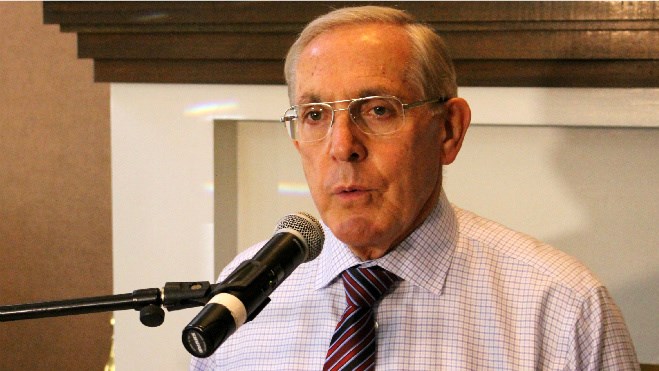Considering every major energy project in Ontario crosses their traditional territory, Energy Minister Bob Chiarelli says First Nations have not been properly consulted about how those projects develop.
“And quite frankly, (the consultation process) was not respectful,” Chiarelli said Thursday. “Want want to create a new paradigm. And the paradigm is, we want to work in partnership.
“We're providing the ways and means for them to participate, and we'll continue to do that moving forward.”
Chiarelli was speaking at a session at the Travelodge in Sudbury, held to get First Nations input on changes to Ontario's Long-Term Energy Plan (LTEP). About 100 Aboriginal leaders from across the North attended, the sixth such session to be held this year.
Since a review of the plan was launched in July, 230 participants from 80 First Nations have taken part in meetings, producing 1,000 reports and 7,800 responses from an online survey.
“It's been a successful process, in part, because of the involvement of First Nations and Metis communities,” Chiarelli said.
Lawyer John Beaucage, who has facilitated all six meetings so far in Ontario, praised the process so far as a major improvement. He said First Nations have had their say in the past, but their words “went into a black hole” and were forgotten.
“In the past, we've been ignored,” Beaucage said. “All too often, developers have come into a band office and left flyers and said that's consultation. That's not consultation.
“And this is not consultation until you say it's consultation. We say that at the start every meeting.”
The real test will be whether the province listens, he said, and whether their ideas and concerns are addressed in the revised energy plan, expected to be released before the winter.
“Your input has meaning,” Beaucage said. “Your input will be listened to.”
One of the ways First Nations are getting involved is through partnerships with the province in power generation, primarily solar and wind energy. When grants for the small FIT programs were announced last summer, 219 of the 951 projects had First Nations participation, generating 46 of the 146 megawatts of power the projects will produce.
The partnerships not only generate economic activity for Aboriginal communities, Chiarelli said, they also offer training and employments opportunities.
“We believe we can significantly expand this engagement,” Chiarelli said. “It sets the tone for how we can move forward and have a substantive relationship.”
Part of the process includes increasing the capacity of Ontario's power lines so they can carry the electricity to the markets. That's critical, says Joe Hare, chief of M'Chigeeng First Nation on Manitoulin Island. As it stands now, Hare said it makes no sense for them to get involved in projects to generate electricity.
“There's no way to transport it to (Southern Ontario ) where it's needed,” Hare said. “There are no lines sufficient to carry what is produced ... So what's the point of trying to plan a project of any kind, involving wind or solar or water, when this blockage is there? It just doesn't make sense.”
Consultation is great, he said, but it's meaningless if their concerns are ignored.
“We went through this process five years ago, and we spoke to the ministry about these problems, and told them nothing could really be done unless they moved on those areas,” he said.
“So here we are five years later, with the same problems, and they haven't done anything. I think there's been six (energy) ministers, and none of them have done anything. And I'm not just talking First Nations, I'm talking northeastern Ontario. They've shut us out.”
For a closer look at the long-term energy plan, go to www.cansia.ca/news-media-archive/ontarios-review-long-term-energy-plan.
Join Sudbury.com+
- Messages
- Post a Listing
- Your Listings
- Your Profile
- Your Subscriptions
- Your Likes
- Your Business
- Support Local News
- Payment History
Sudbury.com+ members
Already a +member?
Not a +member?
Sign up for a Sudbury.com+ account for instant access to upcoming contests, local offers, auctions and so much more.
